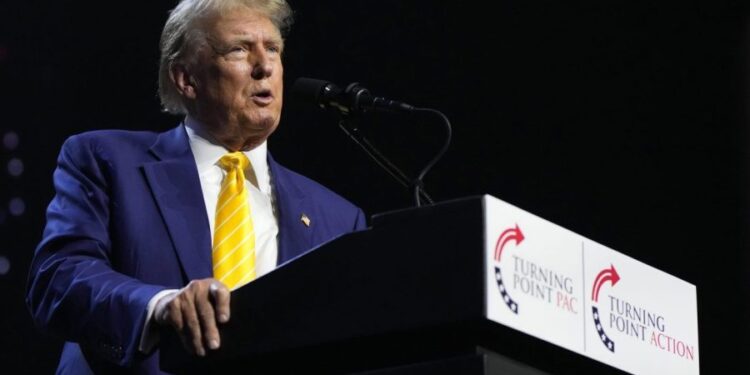
Former President Donald Trump opined lasty month that abortion “seems to be much less of an issue, especially in those [states] where they have exceptions” for rape, incest and the life of the mother. “I think the abortion issue has been taken down many notches.” He also promised on social media that “My Administration will be great for women and their reproductive rights.”
Trump knows that a substantial majority of Americans strongly oppose the Supreme Court decision overturning Roe v. Wade. His attempts to appeal to both supporters and opponents of reproductive rights demonstrate that he will say just about anything to get elected.
Identifying himself as “pro-choice” for most of his adult life, Trump declared he was “pro-life” when he began to consider running for political office. In 2016, he proposed that women who got abortions should receive “some form of punishment,” then walked that back. In 2022, he hailed the Dobbs decision as “the biggest WIN for LIFE in a generation,” and gave himself credit for appointing the justices responsible for the decision.
In April 2024, Trump signaled support for a federal abortion ban: “people are agreeing on 15 [weeks], and I’m thinking in terms of that, and I’ll come out to something that’s very reasonable.” A month later he changed his mind: “The states will determine by vote or legislation, or perhaps both. And whatever they decide must be the law of the land, or in this case the law of the state.” In July, he said abortion “should have never been in the federal government.”
In August, Trump reiterated his opposition to Florida’s ban on abortions after six weeks. Asked if he supported an amendment to the state’s constitution expanding the right to abortion, Trump said, “I am going to be voting that we need more than six weeks.” Faced with a firestorm of criticism from anti-abortion groups, Trump campaign officials maintained he “has not yet said how he will vote on the ballot initiative.”
Trump followed with an explanation that is best described as word salad. “So, I think you need more time than six weeks…At the same time, the Democrats are radical because the nine months is such a ridiculous situation…and you know some of the states like Minnesota and other states have it where you can actually execute the baby after birth and all of that stuff is unacceptable. So, I’ll be voting no for that reason.” Factcheckers pointed out that the Florida amendment permitted abortion “before viability” (about 24 weeks), and that no state permits executing babies after they are born.
Trump also angered anti-abortion activists by refusing to commit to signing a Republican-sponsored Life at Conception Act stipulating that personhood begins at the moment of conception, “because we now have it back in the states.”
And Trump dodged a question about whether he would order the Food and Drug Administration to limit access to mifepristone, a drug used in a majority of abortions in the U.S.: “You can do things that will be, that would supplement, absolutely. And those things are pretty open and humane. But you have to be able to have a vote.”
At the end of August, with polls showing a slight lead for Vice President Kamala Harris, Trump announced that “because we want more babies,” his administration would require either the federal government or insurance companies to pay the entire cost (which typically runs in the tens of thousands of dollars per individual) of IVF treatments for all Americans. He did not specify whether his proposal would be implemented through the Affordable Care Act, which he has promised to repeal, or whether he has become an advocate of socialized medicine. Nor did Trump reconcile the plan with the 2024 GOP platform, which has language that seems to support rights of citizenship, under the 14th Amendment to the Constitution, to fertilized eggs, embryos and fetuses.
Trump chose Sen. JD Vance (R-Ohio), an anti-abortion zealot, as his running mate, when he thought he would coast to victory against President Biden. Vance has claimed, “We can’t give in to the idea that the federal Congress has no role in the matter, because if it doesn’t, then the pro-life movement is basically not going to exist, I think, for the next couple of years.” When Ohio amended its constitution to allow abortions up to 20 weeks, Vance declared, “There is something sociopathic that tells young women (and men) that it is liberating to murder their own children.” Asked about exceptions for rape and incest, he said, “Two wrongs don’t make a right” and denounced “a society that looks at unborn babies as inconveniences to be discarded.”
With the outcome of the presidential race now very much in doubt, Vance does not mention these views on the campaign trail. He now says he opposes a national ban on abortion.
About 63 percent of Americans want abortion to be legal most or all the time. An increasing number indicate that abortion is the most important issue in the 2024 election. Harris now has a 20-point advantage over Trump on whom voters trust to address it.
Meanwhile, Trump and Vance are betting that their self-serving, self-contradictory strategy will reduce the electoral impact of supporters of reproductive rights.
Glenn C. Altschuler is the Thomas and Dorothy Litwin Emeritus Professor of American Studies at Cornell University.







